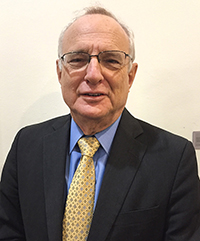WASHINGTON (RNS)—Complaints about religious freedom problems in the United States pale in comparison with atrocities faced by religious minorities abroad, the former U.S. religious freedom ambassador told a forum on tolerance.
 David Saperstein David Saperstein, who recently ended his tenure at the U.S. State Department, said he takes seriously “tough issues,” such as abortion and gay rights, that have divided Americans who emphasize religious or civil rights.
David Saperstein David Saperstein, who recently ended his tenure at the U.S. State Department, said he takes seriously “tough issues,” such as abortion and gay rights, that have divided Americans who emphasize religious or civil rights.
“But make no mistake: As painful and real as these issues are in the hearts and souls of the people making these competing claims, we are talking about people who are being brutalized, we are talking about people who are being imprisoned,” he said of international religious freedom challenges.
“I pray for the day when across the globe the worst problem that we have is how do we balance our competing civil rights claims. What a day for a hallelujah that will be in terms of the entire vision of our international religious freedom efforts.”
The U.S. Commission on International Religious Freedom, chaired by Thomas Reese, hosted the forum, “Tolerance: A Key to Religious Freedom,” co-sponsored by Religion News Service and the Religion News Foundation.
‘Grave humanitarian consequences’
Reese, moderator of the event, said his bipartisan commission is addressing countries, such as North Korea and China, widely considered to be hostile toward religion, and nations such as Iraq and Nigeria that have failed to protect the religious freedoms of their citizens.
“There are grave humanitarian consequences when religious freedom is violated,” he said. “These conditions underscore the need for a different way forward, one of tolerance as a key to religious freedom as well as stability and security.”
A representative of the Hindu American Foundation asked the panelists why U.S. agencies that address religious freedom are dominated by members of the Abrahamic faiths and don’t tend to include people with Eastern philosophies and secular standpoints.
The commission is willing to work with Hindu groups to learn more about persecution of Hindus in countries such as Pakistan and Bangladesh, Reese responded.
“I think that’s very important for us to focus on,” Reese said. “We have to defend not just Christians, not just Jews, not just people from the Abrahamic tradition, but people of all faiths or people who have no faith whatsoever, and I think that is a fundamental principle of religious freedom that we should have.”
Role of educators emphasized
Other panelists at the forum, attended by about 80 journalists, faith leaders and religious freedom experts, stressed the role of educators in building tolerance and religious understanding.
“We have to work with teachers often because they have fears and misconceptions about whether they can even teach about religion,” said Joyce Dubensky, CEO of the Tanenbaum Center for Interreligious Understanding.
They even wonder, she added, “whether they have to avoid talking about the reason Puritans came to the U.S.— religious persecution.”
John Sexton, president emeritus of New York University, teaches students in Shanghai and Abu Dhabi about government and religion, fostering discussions that range from the Crusades to Mideast tensions.
“The heart of the matter is to understand that the core problem here is not anything other than a mindset of certitude and triumphalism that can manifest itself secularly as well as religiously,” he said.
Former Rep. Frank Wolf, a longtime religious freedom activist and senior fellow with the 21st Century Wilberforce Initiative, urged Republicans and Democrats to set aside partisan differences and travel together to global regions to investigate religious persecution firsthand and visit the imprisoned and their families.
“The worst thing in the world is being in the darkest place and think no one cares,” he said.















We seek to connect God’s story and God’s people around the world. To learn more about God’s story, click here.
Send comments and feedback to Eric Black, our editor. For comments to be published, please specify “letter to the editor.” Maximum length for publication is 300 words.